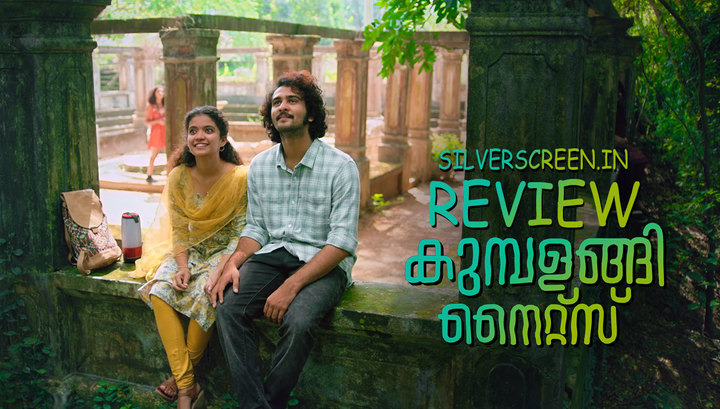Director: Madhu C Narayanan
Cast: Fahadh Faasil, Sreenath Bhasi, Shane Nigam, Soubin Shahir
Composer: Sushin Shyam
Debutant filmmaker Madhu C Narayanan’s Kumbalangi Nights is centered on four brothers who live in an unfinished house without a door, on an islet on Kochi’s backwaters that the rest of the world uses as a ground to dump pets they can no longer keep, and human waste. As the film progresses, more people come under this roof which goes from a broken home to a haven of the orphaned. The journey is as fascinating as it is poignant.
Written by Syam Pushkaran, the film is rich with details and imagery, and brilliantly subtle, elevated by fantastic performances by an ensemble cast that includes several newcomers. The biggest aids to Madhu’s story-telling here are Shyju Khalid’s cinematography that places sense over glossiness, and Sushin Shyam’s musical score that lingers in mind after the movie ends.
The film has no greater story to tell, but proceeds like a game of jigsaw puzzle where pieces are put together one by one to reveal the characters and their milieu in their completeness. The narrative is built up of the inner turmoil of the characters, as it was in Maheshinte Prathikaram which won Syam a National Award in 2017. The interference of the larger outside world is limited to a bunch of caricatures – sometimes too loud for the film’s minimalist appeal, like Shammi (Fahadh Faasil who is over the top here), a newly-wedded salon-owner whose male chauvinism manifests itself as closet sociopath traits. There is also an exotic foreign tourist who moves into the house one day, after she falls in love with the second of the brothers, Boney (Sreenath Bhasi), a mute dancer. These characters leave many loose ends as they add undue gloss to a modest and naturally sweet premise. Shammi’s mental derangement, a reflection of the many pitfalls of the standards of masculinity set by the society, becomes a tool of absurd comedy (there is a nod to The Shining!) in the climatic episode. It laughs at the society’s perception of a perfect family at the cost of the gorgeous subtlety that the film had been holding on till then.
The narrative is anchored by Franky, the youngest of the brothers, who studies in a university with a scholarship that helps him build a proper toilet in the house. He is the only one who manages to move away from Kumbalangi to see a wider and brighter outside world that makes him see the deprivation of the place he comes from more vividly than ever. The pathos in the initial part of the film, where he comes home on a vacation, is sublime and delicate, the slow-pace of the film mirroring Franky’s deep despair. It is through him we see the hollowness in the brothers.
The family in Kumbalangi Nights is fuelled and held together by a collective sense of loss and social alienation than by blood, as it is in Shoplifters (2018), Japanese filmmaker Hirokazu Kore-eda’s Oscar-nominated drama. The brothers live in absolute poverty – material and social. In the latter half of the film, a single mother moves into the house with her few-days-old baby. Notwithstanding the instant poignancy that the scene of her homecoming evokes, there is a larger question of what will bind her to this house that looks like an unruly mess. In the following scene, you see a shot of Franky smiling blissfully to the tune of lullaby that she sings to her child. She completes the house that had been quietly pining for the presence of a mother.
The film’s heart, by far, lies in Saji (Soubin Shahir), an unemployed man who is valued neither by the society nor by his brothers. Shahir delivers a majestic performance as the man who goes to the brink of suicide at one point (it is a stunningly shot scene), and comes back only to undergo an even painful heartbreak. It is through Saji the film finds purpose. An over-head shot of an islet and a canoe on the banks of it, is followed by a mirroring sequence where Saji and Bobby (Shane Nigam), the third brother, open the flood-gates of their mind to a therapist and a lover respectively. It is a gentle, yet arresting point that turns the course of the narrative.
The film subverts a popular commercial cinema trope used to establish that all that a person needs to succeed in life is determination and a willingness to work hard. Bobby (Shane Nigam) makes a sincere effort to get out of his sub-par life. He joins a corporate marine company’s sales department. In a sensitively staged sequence, Bobby confesses to his lover of his helplessness; the dire lack of motivation he faces at work. Who would take care of the needs of the soul that finds itself famished in an insensitive culture which treats human beings like machines?
Writer Syam Pushkaran, despite his ability to zoom into people and situations like no one else in Malayalam cinema at the moment, often plays to the gallery, resorting to the language of pop-culture that reduces the film into a coffee-table book. More often than not, it feels as though the writer has pushed words into the mouths of the characters, who seem to be talking to the audience than to each other. Like the time Appu in Mayaanadhi shocked her lover and the audience with the line, “Sex is not a promise”, that would be a perfect fit for a meme or a campaign tagline than an onscreen moment. In Kumbalangi Nights too, Syam’s dialogues often lean towards commercial aspirations than to what the scene demands. As a result, several of the characters in the film make an appearance only for the sake of making commentary. Like Prashantan, Bobby’s friend, whose dark complexion gets onscreen relevance in a set of dialogues that are sure to earn applause in the movie hall, but lose purpose in hindsight.
Recommended
Kumbalangi Nights, like last year’s Sudani From Nigeria, displays an unconventional sense of compassion and optimism, and tops it with a playful rebelliousness that challenges the societal norms. The lovers don’t care about class-religious differences, and are unafraid of public gaze or of being judged. A meek wife loses her cool and stands up for herself and her sister against her husband who wants to be the unquestioned head of the family. A young man embraces his hidden talent for fishing without any shame, and sets out to earn a livelihood out of it. It is in these character constructs that Syam’s exceptional talent and curiosity about human conditions shines the brightest.
*****
The Kumbalangi Nights review is a Silverscreen original article. It was not paid for or commissioned by anyone associated with the movie. Silverscreen.in and its writers do not have any commercial relationship with movies that are reviewed on the site.



